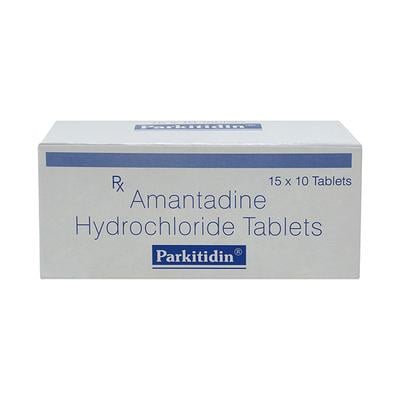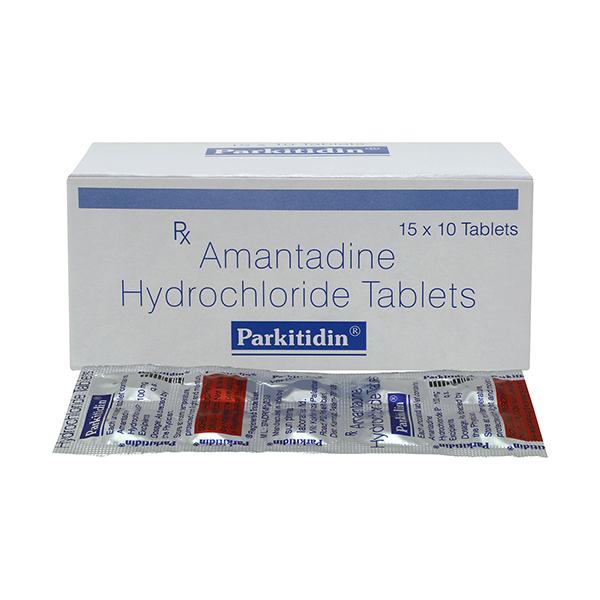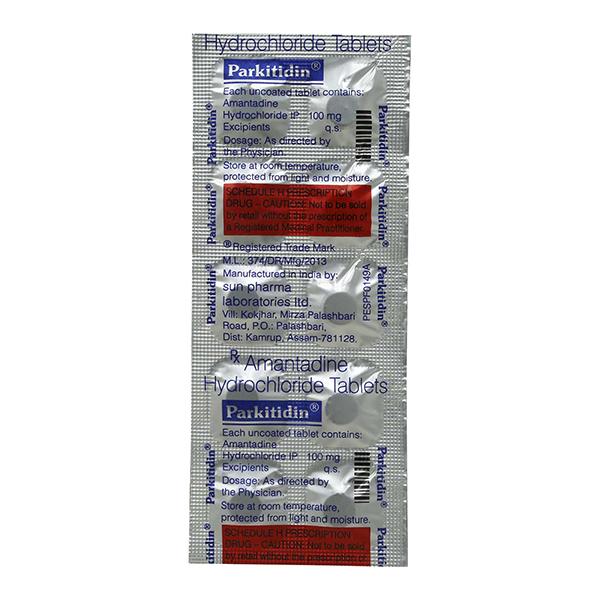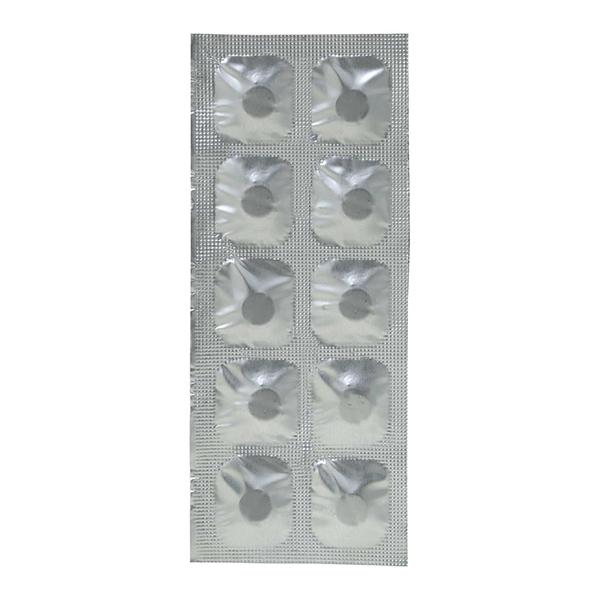

Netmeds First Membership
Quick Links
Introduction About PARKITIDIN TABLET
Parkitidin Tablet contains Amantadine, a dopamine agonist medicine that supports better muscle coordination and movement. It is effective for individuals facing difficulty with walking, gripping, or maintaining body balance. Additionally, Parkitidin helps manage viral infections such as shingles (herpes zoster) and influenza A. This tablet is specially formulated to assist those with movement-related nervous system disorders, including Parkinson’s disease and drug-induced movement symptoms. When taken regularly as directed by healthcare professionals, Parkitidin Tablet may improve daily functioning by promoting smoother, more controlled body movements, helping users regain independence and enhance their quality of life.
Take Parkitidin Tablet exactly as prescribed by your doctor. You may take the tablet with or without food, preferably at the same time every day, to maintain a consistent level of the medicine in your bloodstream. Follow your doctor’s instructions carefully regarding the dose and duration of management. If you miss a dose, take it as soon as you remember. Complete the full prescribed course of Parkitidin Tablet even if you start feeling better. Do not stop taking this medication suddenly without consulting your healthcare provider, as abrupt discontinuation may cause adverse effects. Maintaining regular use helps support muscle coordination and movement effectively for people with Parkinson’s disease and other movement disorders.
Common side effects of Parkitidin Tablet include nausea, dizziness, insomnia, dry mouth, constipation, blurred vision, hallucinations, and balance difficulties. If you experience dizziness, it is important to rise slowly from sitting or lying positions to reduce falls. Avoid driving or operating heavy machinery until you understand how this medicine affects your focus and coordination. Most side effects are temporary and improve as your body adjusts, but consult your doctor if symptoms persist or worsen.
This medicine may increase the risk of seizures. It is important to inform your doctor if you have a history of seizures or are currently taking any medication for seizure control. Pregnant or breastfeeding women should consult with their healthcare provider before starting this medicine to ensure it is suitable and safe for their condition. Always follow your doctor’s advice for the safest use of Parkitidin Tablet.
Uses Of PARKITIDIN TABLET
- Supports management of symptoms in Parkinson’s disease such as muscle stiffness, tremors, and movement difficulties
- Helps improve muscle coordination, balance, and daily functioning in movement disorders
- Used for drug-induced movement symptoms caused by certain medications
- Aids in managing viral infections including shingles (herpes zoster) and influenza A
- Enhances quality of life by promoting smoother and more controlled body movements
Benefits of PARKITIDIN TABLET
01)Supports Muscle Coordination and Movement:
Parkitidin Tablet helps improve muscle control and body movement in individuals experiencing challenges with Parkinson’s disease and other movement disorders.
02)Enhances Daily Functional Activities:
By aiding smoother and more controlled movements, this tablet promotes independence and boosts overall quality of life.
03)Helps Manage Parkinson’s Disease Symptoms:
It supports relief from common Parkinson’s symptoms such as tremors, muscle stiffness, and difficulty in movement by increasing dopamine levels in the brain.
04)Assists in Drug-Induced Movement Disorders:
Parkitidin is beneficial for reducing movement-related side effects caused by certain medications.
05)Supports Viral Infection Management:
This medicine also helps address viral infections like shingles (herpes zoster) and influenza A, adding to its therapeutic versatility.
06)Convenient and Consistent Dosing:
Formulated for regular use under medical supervision to maintain steady medication levels and optimal effectiveness.
How PARKITIDIN TABLET Works
How Parkitidin Tablet Works
Parkitidin Tablet helps enhance muscle control and body movements by supporting brain pathways that manage coordination and motor skills.
Mechanism of Action of Amantadine
Amantadine promotes the release of dopamine and reduces dopamine reuptake in the brain, improving communication between nerve cells involved in movement regulation.
Dopamine Enhancement and Movement Support
By increasing dopamine availability, Parkitidin supports smoother muscle function and helps manage symptoms related to slow or uncoordinated movements.
Role in Regulating Motor Signals
The medication modulates signals between brain cells responsible for motor control, aiding in the coordination of voluntary movements.
NMDA Receptor Blocking Effect
Amantadine acts as a mild blocker of NMDA receptors, which may contribute to its positive effect on reducing excessive nerve activity and improving movement control.
Impact on Muscle Coordination and Control
Through combined dopaminergic and NMDA receptor effects, Parkitidin fosters better muscle coordination, balance, and overall motor function for daily activities.
How to use PARKITIDIN TABLET
How to Take Parkitidin Tablet
- Take Parkitidin Tablet as directed by your healthcare provider, with or without food.
- Try to take it at the same time each day to maintain steady medicine levels in your body.
- Swallow the tablet whole without crushing or chewing.
Recommended Dosage Guidelines
- Follow the dosage and duration advised by your doctor based on your condition, age, and body weight.
- Do not adjust the dose on your own.
- Typically, the dose is once or twice daily depending on individual needs.
Administration Tips for Best Results
- Maintain consistent dosing times, avoid missing doses, and follow all instructions carefully.
- Inform your doctor about other medications you take to avoid interactions.
Consultation Prior to Dose Change
- Always consult your doctor before changing or stopping Parkitidin Tablet to ensure safe adjustments and avoid withdrawal effects.
What if I forgot to take PARKITIDIN TABLET
- If you miss a dose, take it as soon as you remember unless the next dose is near.
- Do not double the dose to catch up.
- In case of overdose, seek immediate medical help.
Side Effects Of PARKITIDIN TABLET
Like all medicines, Parkitidin Tablet may cause certain side effects in some individuals, although not everybody gets them.
Common:
- Nausea
- Dizziness
- Insomnia
- Dry mouth
- Constipation
- Blurred vision
- Hallucinations
- Balance difficulties
When to consult your doctor?
- Severe dizziness or fainting
- Convulsions or seizures (fits)
- Sudden confusion or disorientation
- Hallucinations or seeing things that aren’t real
- Difficulty breathing or shortness of breath
- Fast, irregular, or pounding heartbeat
- Severe muscle stiffness or uncontrolled movements
- Loss of bladder control
- Severe allergic reactions symptoms such as rash, itching, swelling, or difficulty swallowing
- Mental health changes such as extreme mood swings, depression, or thoughts of self-harm
How To Manage Side Effects
Constipation
- Stay Hydrated: Drink plenty of water throughout the day to help soften stools and promote regular bowel movements.
- Increase Fiber Intake: Include fiber-rich foods such as fruits, vegetables, whole grains, and legumes in your diet to support digestive health.
- Regular Physical Activity: Engage in light exercises like walking to stimulate bowel function and relieve constipation.
- Avoid Processed Foods: Limit intake of low-fiber, processed foods that can worsen constipation.
- Establish a Routine: Try to maintain a regular time for bowel movements to encourage consistency.
- Consult Your Doctor: If constipation persists or becomes severe, seek medical advice for possible adjustments or supportive management.
Dizziness Or Drowsiness
- Sit or Lie Down: If you feel dizzy, sit down, or lie down immediately to reduce falling. Keep your head still and close your eyes if needed.
- Hydrate: Dehydration can cause dizziness, so drink water or electrolyte-replenishing drinks like sports drinks.
- Avoid Sudden Movements: When standing or sitting, do so slowly to avoid triggering dizziness. Take your time when getting up.
- Eat Small, Regular Meals: Low blood sugar can cause dizziness, so eat small meals throughout the day and avoid skipping meals.
- Fresh Air: Sometimes dizziness can be alleviated by taking slow, deep breaths in a well-ventilated area.
Nausea And Vomiting
- Stay Hydrated: Sip fluids slowly, such as water, ginger tea, or clear soups to support hydration and reduce discomfort.
- Eat Small, Bland Meals: Choose light foods like crackers, toast, or plain rice to minimize stomach irritation.
- Avoid Strong Odors and Spicy Foods: These can worsen feelings of nausea and should be limited during symptoms.
- Rest and Relaxation: Rest in a comfortable position and avoid sudden movements to calm the digestive system.
- Seek Medical Advice: Consult a healthcare provider promptly if nausea is severe, persistent, or accompanied by vomiting.
Warning & Precautions
Pregnancy
ContraindicatedParkitidin Tablet is not recommended during pregnancy. Consult your doctor if you are pregnant or planning to conceive before taking this medicine.
Breastfeeding
ContraindicatedParkitidin Tablet is not recommended for use while you are breast feeding as it may pass through breast milk and could harm the baby. Consult your doctor before taking it.
Driving and Using Machines
Use with CautionParkitidin may cause dizziness or blurred vision. Do not drive or operate heavy machinery until you know how this medicine affects your alertness and coordination.
Alcohol
ContraindicatedConsuming alcohol with Parkitidin Tablet can increase side effects like dizziness, confusion, and low blood pressure. Avoid alcohol while taking this medication.
Kidney
Consult your doctorParkitidin Tablet is not recommended for use in patients with serious kidney disease and should be used with caution in patients with mild or moderate kidney disease. Dosage adjustments may be necessary. Consult with your doctor for advice before taking it.
Liver
Use with CautionParkitidin Tablet should be used with caution in patients with liver disease. Consult with your doctor before taking it.
Allergy
ContraindicatedDo not take Parkitidin Tablet if you are allergic to Amantadine or any other ingredients of this medicine.
Heart Disease
Use with CautionParkitidin Tablet should be used with caution in patients with a history of disease involving the heart and blood vessels or suffering from heart problems or heart failure (which causes shortness of breath or ankle swelling). Consult with your doctor before taking it.
Use In Pediatrics
Consult your doctorParkitidin Tablet is not recommended for use in newborn and infants (below 1 year of age). It is used in children (from 1 to 12 years of age). Your child’s doctor may adjust the dose based on the age and body weight. Consult your paediatrician before giving it.
Use In Geriatrics
Use with CautionParkitidin Tablet should be used with caution in elderly patients who are 65 years of age or older, and your doctor may initiate the management with the lowest effective dose in patients with kidney impairment, heart failure, peripheral oedema (swelling of legs or hands) or low blood pressure (especially when standing up from sitting or lying position). Consult with your doctor before taking it.
Other Warnings for PARKITIDIN TABLET
Before taking PARKITIDIN TABLET inform your doctor if you have:
- Mental Health Conditions
- Increased Eye Pressure (Glaucoma)
Who should not take [GBNKEYWORD
PARKITIDIN TABLET is not recommended for use if you have:
- Convulsions (Fits)
- History of Stomach or Intestinal Ulcers
Drug - Drug interaction
01)Procyclidine and Other Anticholinergics
Interaction: Concurrent use with Parkitidin Tablet may increase the risk of side effects such as dry mouth, dizziness, and confusion.
Effects: Enhanced anticholinergic side effects including blurred vision, urinary retention, and constipation.
Management: Close monitoring by healthcare provider; dose adjustments may be necessary to minimize adverse effects.
02)Neuroleptic Medications (Chlorpromazine, Haloperidol, Quetiapine, Risperidone)
Interaction: Potentiation of Parkitidin’s central nervous system effects, increasing sedation and motor side effects.
Effects: Increased risk of drowsiness, impaired movement control, and mental status changes.
Management: Inform your doctor if taking these medications, dose adjustments or alternative therapies may be considered.
03)Diuretics (Hydrochlorothiazide, Triamterene, Amiloride)
Interaction: May reduce the effectiveness of Parkitidin and increase the risk of electrolyte imbalances.
Effects: Symptoms may include muscle weakness, irregular heartbeat, and fatigue.
Management: Regular electrolyte monitoring and dose review by healthcare provider during combined use.
04)Anticholinergic Agents for COPD and Incontinence (Ipratropium, Tiotropium, Oxybutynin)
Interaction: Enhanced anticholinergic side effects leading to increased dryness, dizziness, and urinary retention.
Effects: Potential worsening of side effects such as blurred vision and constipation.
Management: Use with caution and under medical supervision, adjusting doses as needed.
05)Potassium Supplements and Potassium-sparing Diuretics
Interaction: Concurrent use may increase potassium levels, leading to hyperkalemia.
Effects: Symptoms can include muscle cramps, irregular heartbeat, and weakness.
Management: Monitor potassium levels regularly and adjust medication accordingly.
Drug - Food interaction
01)High-Fat Meals
Interaction: High-fat meals may delay the absorption of Amantadine, the active ingredient in Parkitidin Tablet.
Effects: This can lead to slower onset of action but does not reduce the overall effectiveness.
Management: Take Parkitidin Tablet consistently with regard to meals as directed by your healthcare provider.
02)Caffeine-Containing Foods and Drinks (Tea, Coffee, Chocolates)
Interaction: Caffeine intake can counteract the calming effect of Parkitidin on the brain.
Effects: May cause increased nervousness, restlessness, or jitteriness.
Management: Limit caffeine-containing foods and beverages while taking Parkitidin Tablet.
03)Dairy Products
Interaction: Milk and dairy products may interfere with medication absorption and aggravate certain conditions.
Effects: May reduce the effectiveness of the medicine or cause gastrointestinal discomfort.
Management: It is advisable to separate the timing of Parkitidin Tablet and dairy intake; consult your doctor for personalized advice.
04)Alcohol
Interaction: Combining alcohol with Parkitidin Tablet can amplify side effects like dizziness, confusion, and low blood pressure.
Effects: Increased risk of accidents due to impaired coordination and mental alertness.
Management: Avoid alcohol consumption during treatment with Parkitidin Tablet.
Synopsis
|
Drug |
: |
Amantadine |
|
Pharmacological Category |
: |
Dopamine agonist |
|
Therapeutic Indication |
: |
Parkinson’s disease, Drug-induced movement symptoms, Viral infections including shingles (herpes zoster) and influenza A |
|
Dosage Forms |
: |
Tablet, Capsule |
More Information
01)How to Safely Use Parkitidin Tablets in Your Daily Routine: Tips for Hydration, Movement, and More?
|
Aspect |
Tips for Safe Use |
Explanation & Benefits |
|
Hydration |
Drink plenty of water daily |
Maintains body hydration, reduces side effects like dry mouth and constipation |
|
Medication Timing |
Take Parkitidin Tablet at the same time every day |
Ensures consistent medicine levels in your body for optimal effect |
|
Food Intake |
Can be taken with or without food |
Flexibility in dosing reduces risk of stomach discomfort |
|
Movement & Activity |
Rise slowly from sitting or lying down |
Helps prevent dizziness and low blood pressure-related falls |
|
Rest & Sleep |
Get adequate rest and sleep |
Supports overall well-being and may reduce insomnia side effects |
|
Avoid Alcohol |
Refrain from consuming alcohol |
Prevents increased dizziness, confusion, and blood pressure changes |
|
Driving & Operation |
Do not drive or operate heavy machinery until effects are known |
Avoids accidents due to dizziness or blurred vision |
|
Missed Dose |
Take missed dose as soon as remembered unless next dose is near |
Avoids missed treatment benefits and prevents overdose |
|
Consult Healthcare |
Regularly update your doctor on side effects or other medicines |
Ensures safe use and proper adjustments if needed |
FAQs About PARKITIDIN TABLET
Q: What is Parkitidin Tablet used for?
A: Parkitidin Tablet supports management of Parkinson’s disease symptoms, including tremors, muscle stiffness, and difficulty with body movement. It also helps manage drug-induced movement disorders and has antiviral properties against infections like influenza A.
Q: How does Parkitidin Tablet work?
A: This tablet increases dopamine levels in the brain, which enhances muscle coordination and movement control. It also blocks certain receptors to regulate nerve signals and may hinder viral growth, supporting overall nervous system function.
Q: Can Parkitidin Tablet be taken with food?
A: Yes, Parkitidin Tablet can be taken with or without food. Taking it at the same time every day helps maintain steady medication levels for best results.
Q: What are the common side effects of Parkitidin Tablet?
A: Common side effects include nausea, dry mouth, dizziness, constipation, blurred vision, insomnia, hallucinations, and balance issues. Most side effects are temporary and decrease with continued use.
Q: Is Parkitidin Tablet safe during pregnancy or breastfeeding?
A: Parkitidin Tablet is not recommended during pregnancy or breastfeeding. Consult your doctor before use to evaluate the benefits and risks.
Q: What should I do if I miss a dose of Parkitidin Tablet?
A: Take the missed dose as soon as you remember unless it is close to the next scheduled dose. Avoid doubling up to catch up.
Q: Can I drive or operate machinery while on Parkitidin Tablet?
A: Avoid driving or using heavy machinery until you know how the medication affects you, as it can cause dizziness or blurred vision.
Q: Are there any important drug interactions with Parkitidin Tablet?
A: Yes, inform your doctor if you are taking anticholinergic medications, neuroleptics, diuretics, or potassium supplements, as these can interact and alter side effects or effectiveness.
References
1. Bertram G. Katzung, Pharmacologic Management of Parkinsonism & Other Movement disorders, Basic and clinical pharmacology, Fourteenth Edition. 2015. Page- 501.
2. K.D. Tripathi. Drugs acting on central nervous system. Essentials of medical pharmacology. Sixth edition. 2013. Page- 421.
3. Chang C, Ramphul K. NIH National Library of Medicine; National centre for biotechnology information. [Revised in June 2022] [Accessed on September 22nd, 2025] ![]()
4. Sheik Hosenbocus, Raj Chahal. Amantadine: a review of use in child and adolescent psychiatry. NIH National Library of Medicine; National centre for biotechnology information. PubMed.gov. February 2013. [Accessed on September 22nd, 2025] 
5. Upsher-Smith Laboratories. NIH National Library of Medicine; National centre for biotechnology information. Dailymed. [Revised in May 2020] [Accessed on September 22nd, 2025] 
6. Chanelle Medical. Electronic Medicines Compendium (EMC). [Revised in January 2021] [Accessed on September 22nd, 2025] 












